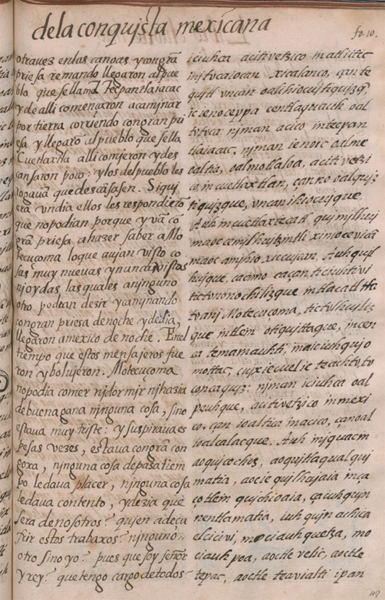Folio 10 recto
Translations and Transcriptions
Spanish Translation
[Translation of the Nahuatl into Spanish by Fr. Bernardino de Sahagún; transcription of the Spanish (left-hand column) by James Lockhart:] [f. 10r.] otra uez en las canoas y con grā priesa remando llegaron al pueblo que se llama Tecpantlaiacac y de alli començaron a caminar por tierra corriendo con gran priesa y llegarō al pueblo que se lla* Cuetlaxtla alli comieron y descansaron poco: y los del pueblo les rogauā que descāsen. Siquiera vn dia ellos les respondierō que no podian porque yvā cō grā priesa a hazer saber a Motecuçoma lo que auian visto cosas muy nueuas y nunca vistas ni oydas las quales a ninguno otro podian dezir y caminando con gran priesa de noche y de dia, llegaron a mexico de noche. En el tiempo que estos mensajeros fueron y boluieron. Motecuçoma no podia comer ni dormir ni hazia de buena gana ninguna cosa, sino estaua muy triste: y suspiraua espesas vezes, estaua con grā congoxa, ninguna cosa de pasatiempo le daua placer, ninguna cosa le daua contento, y dezia que sera de nosotros? quien a de çufrir estos trabaxos? ninguno otro sino yo! pues que soy señor y rey! que tengo cargo de todos! ---------- *LLA. For "llama."
English Translation
[Translation of the Nahuatl (right-hand column) by James Lockhart:]
By water they quickly reached the place called Xicalanco, where they did nothing but catch their breath, then again came running along as fast as possible. Then they reached Tecpantlayacac, where upon they again left and came fleeing. They quickly got to Cuetlaxtlan, where they caught their breath and also quickly came away.
And the
Analytic Transcription
[Transcription of the Nahuatl (right-hand column) by James Lockhart:] [f. 10r.] iciuhca acitivetzico in atl iitic in itocaiocanxicalanco, çan tequitl vncan oalihiocuitiquizq̄, ic ie no ceppa centlaquauh oaltotoca: niman acico in tecpantlaiacac, niman ie no ic oalmeoaltia, oalmotlaloa, acitivetzico in cuetlaxtlan, çanno oalquiztiquizque, vncan ihiocuique. Auh in cuetlaxtecatl quimilhui ma oc cemilhuitzintli ximocevicā ma oc amihio xiccuican. Auh quilhuique, ca amo ca çan ticiuhtivi tictono-nochilizque in tlacatl tlatoani Motecuçoma, tictolhuilizque in tlein otiquittaque, in cenca temamauhti, in aiciuhqui omottac, cuix ie cuel ie teachto, toconcaquiz: niman iciuhca oalpeuhque, activetzico in mexico, çan ioaltica in acico, çan oalioalcalacque. Auh in iquac in aoquicochiz, aoquitlaqual quimatia,aoc ie quilhuiaia in çaço tlein quichioaia, ça iuhquin nentlamatia, iuhquin achica elcicivi, mociauhquetza, mociauhpoa, aoctle velic, aoctle tepac, aoctle teavialti ipan
Image

Spanish Translation
[Translation of the Nahuatl into Spanish by Fr. Bernardino de Sahagún; transcription of the Spanish (left-hand column) by James Lockhart:] [f. 10r.] otra uez en las canoas y con grā priesa remando llegaron al pueblo que se llama Tecpantlaiacac y de alli començaron a caminar por tierra corriendo con gran priesa y llegarō al pueblo que se lla* Cuetlaxtla alli comieron y descansaron poco: y los del pueblo les rogauā que descāsen. Siquiera vn dia ellos les respondierō que no podian porque yvā cō grā priesa a hazer saber a Motecuçoma lo que auian visto cosas muy nueuas y nunca vistas ni oydas las quales a ninguno otro podian dezir y caminando con gran priesa de noche y de dia, llegaron a mexico de noche. En el tiempo que estos mensajeros fueron y boluieron. Motecuçoma no podia comer ni dormir ni hazia de buena gana ninguna cosa, sino estaua muy triste: y suspiraua espesas vezes, estaua con grā congoxa, ninguna cosa de pasatiempo le daua placer, ninguna cosa le daua contento, y dezia que sera de nosotros? quien a de çufrir estos trabaxos? ninguno otro sino yo! pues que soy señor y rey! que tengo cargo de todos! ---------- *LLA. For "llama."
English Translation
[Translation of the Nahuatl (right-hand column) by James Lockhart:]
By water they quickly reached the place called Xicalanco, where they did nothing but catch their breath, then again came running along as fast as possible. Then they reached Tecpantlayacac, where upon they again left and came fleeing. They quickly got to Cuetlaxtlan, where they caught their breath and also quickly came away.
And the
Analytic Transcription
[Transcription of the Nahuatl (right-hand column) by James Lockhart:] [f. 10r.] iciuhca acitivetzico in atl iitic in itocaiocanxicalanco, çan tequitl vncan oalihiocuitiquizq̄, ic ie no ceppa centlaquauh oaltotoca: niman acico in tecpantlaiacac, niman ie no ic oalmeoaltia, oalmotlaloa, acitivetzico in cuetlaxtlan, çanno oalquiztiquizque, vncan ihiocuique. Auh in cuetlaxtecatl quimilhui ma oc cemilhuitzintli ximocevicā ma oc amihio xiccuican. Auh quilhuique, ca amo ca çan ticiuhtivi tictono-nochilizque in tlacatl tlatoani Motecuçoma, tictolhuilizque in tlein otiquittaque, in cenca temamauhti, in aiciuhqui omottac, cuix ie cuel ie teachto, toconcaquiz: niman iciuhca oalpeuhque, activetzico in mexico, çan ioaltica in acico, çan oalioalcalacque. Auh in iquac in aoquicochiz, aoquitlaqual quimatia,aoc ie quilhuiaia in çaço tlein quichioaia, ça iuhquin nentlamatia, iuhquin achica elcicivi, mociauhquetza, mociauhpoa, aoctle velic, aoctle tepac, aoctle teavialti ipan
Image
